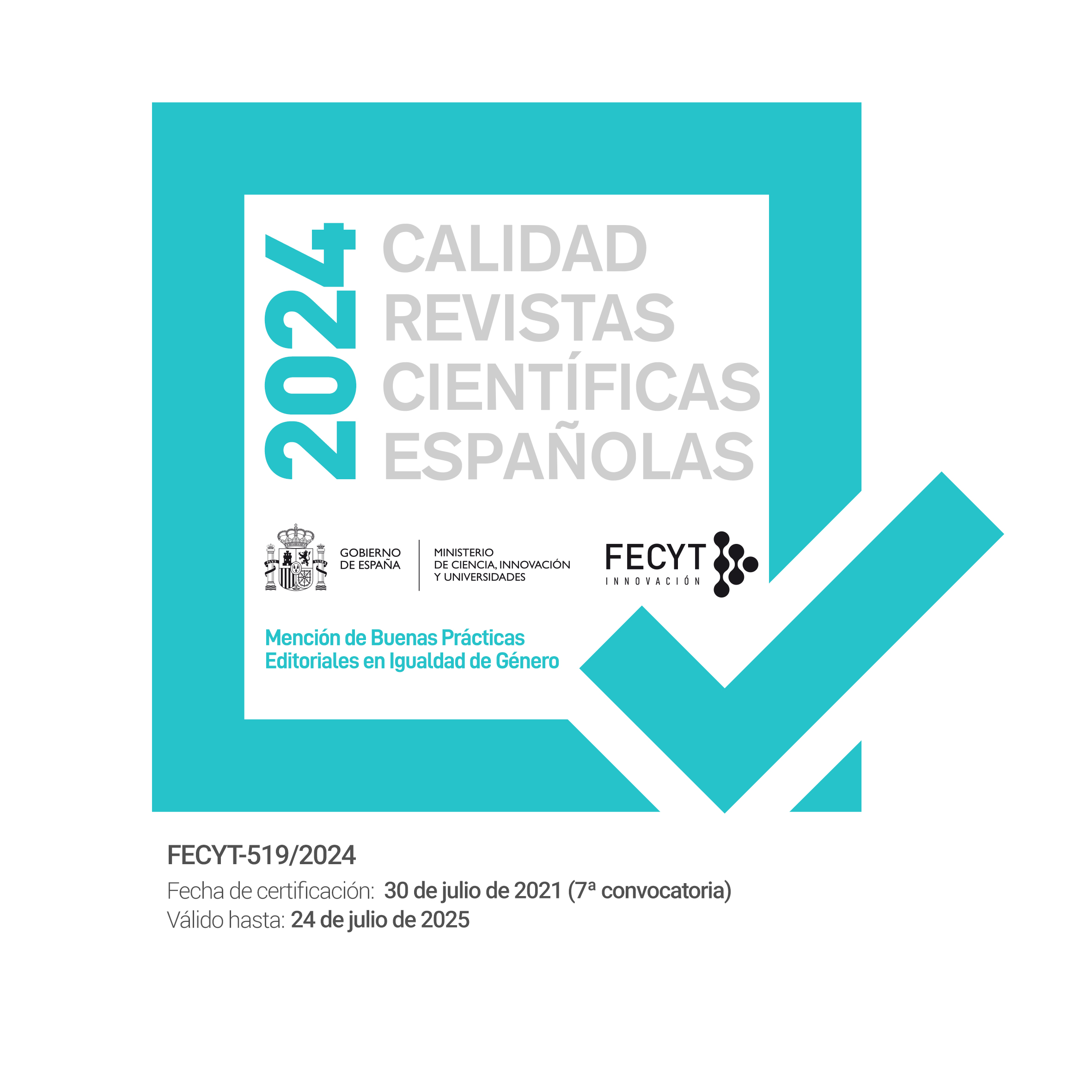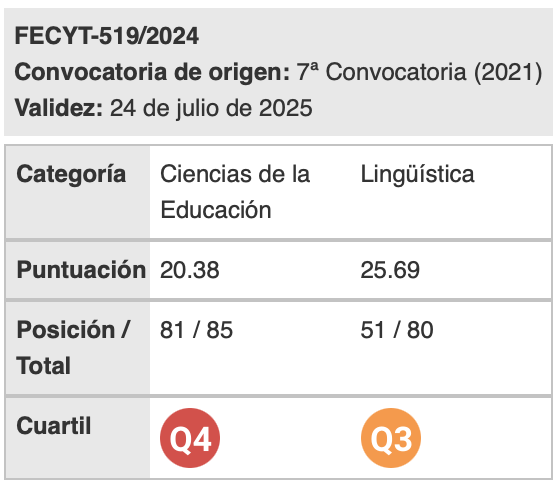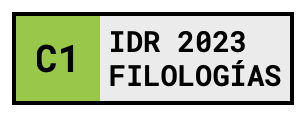A contrastive analysis of epistemic modality in scientific English
Palabras clave:
epistemic modality, non-native English speakers, native English speakers, contrastive studyResumen
This paper investigates the use of epistemic expressions in scientific English. The main aim of this research is to analyse if native speakers of English use epistemic modality in the same way than non-native speakers of English and to detect the most outstanding cognitive implications of this fact. The corpus used in this research contains 50 research papers written by native English speakers and 50 scientific papers written by Spanish researchers who use English to communicate internationally. As epistemic modals are used to indicate the possibility of some piece of knowledge, this paper focuses on epistemic modal verbs in order to detect if native speakers of English and non-native speakers of English commu- nicate modality in the same way, or if there are differences in frequency and use. The results obtained in this analysis indicated that there are differences in the frequency of use of epistemic expressions, even if the intention of the writers is the same.
Descargas
Citas
Alonso-Almeida, F. (forthcoming b). Sentential evidential adverbs and authorial stance in a corpus of English computing articles. Revista española de lingüística aplicada.
Alonso-Almeida, F. (forthcoming a). Propositional epistemic and evidential strategies in Spanish and English texts on computing. in J. R. Zamorano (ed.) Thinking Modally: English and Contrastive Studies on Modality. Newcastle upon Tyne: Cambridge Scholars Publishing.
Alonso-Almeida, F. and Cruz-García, L. (2011). The value of may as an evidential and epistemic marker in English medical abstracts. Studia Anglica Posnaniensia, 46(3), 59-73.
Alonso-Almeida, F. and González-Cruz, M. I. (forthcoming). Exploring male and female voices through epistemic modality and evidentiality in some modern english travel texts on the Canaries. Research in Language.
Biber, D., Conrad, S. and Reppen, R. (1998). Styles of stance in English: lexical and grammatical marking of evidentiality and affect. Text 9, 93-125.
— Johansson, S., Leech, G., Conrad, S. and Finegan, E. (1999). Longman Grammar of Spoken and Written English. london: longman.
Carretero, M. (1992). The role of epistemic modality in English politeness strategies. Miscelánea 13, 17-35.
Carretero, M. (2002). The influence of genre and register on epistemic modality in spoken English: a preliminary study. Estudios Ingleses de la Universidad Complutense, 10, 11-41.
Carretero, M. (2004). The role of evidentiality and epistemic modality in three English spoken texts from legal proceedings. in J. i. Marín-Arrese (ed.) Perspectives on Evidentiality and Epistemic Modality. Madrid: Editorial Complutense, 25-62.
Chafe, W. (1986). Evidentiality in English conversation and academic writing. in W. Chafe and J. Nichols (eds.) Evidentiality: The linguistic coding of epistemology. Norwood: Ablex, 261–72.
Charles, M. (2007). Argument or evidence? disciplinary variation in the use of the noun that pattern in stance construction. English for Specific Purposes, 26, 203-218.
Collins, P. (2009). Modals and Quasi-modals. Amsterdam and New York: Rodopi. Cornillie, B. (2009). Evidentiality and epistemic modality. On the close relationship
between two different categories. Functions of Language, 16(1), 44-62.
Diewald, G., Kresic, M. and Smirnova, E. (2009). The grammaticalization channels of evidentials and modal particles in German: integration in textual structures as a common feature. in M. M. Hansen and J. Visconti (eds) Current Trends in Diachronic Semantics and Pragmatics. UK: Emerald, 189-210.
Ferrari, L. (2009). Marcadores de modalidad epistémico y evidencial en el análisis de las conclusiones de artículos de investigación de disciplinas distintas. ALED.
Fintel, K. von and Gillies, A. S. (2007). An opinionated guide to epistemic modality. in T. S. Gendler and J. Hawthorne (eds.), Oxford Studies in epistemology, 2. Oxford: Oxford University Press, 32-62.
Freddi, M. (2005). Arguing linguistics: Corpus investigation of one functional variety of academic discourse. Journal of English for Academic Purposes, 4, 5-26.
Haan, P. de and van Esch, K. (2005). The development of writing in English and Spanish as foreign languages. Assessing Writing, 10, 100-116.
Hidalgo-Downing, L. (2004). Non-verbal markers of modality and evidentiality and the expression of writer stance in a comparable corpus of editorials and news articles. in J. i. Marín Arrese (ed.) Perspectives on Evidentiality and Modality. Madrid: Editorial Complutense, 205-28.
Hinkel, E. (2009). The effects of essay topics on modal verb uses in l1 and l2 academic writing. Journal of Pragmatics, 41, 667-683.
Huddleston, R. (1988). English grammar: An outline. london: Athenaeum Press ltd.
Huddleston, R. D. & Pullum, G.K. (2002) The Cambridge grammar of the English language. Cambridge: CUP.
Kranich, S. (2009). Epistemic modality in English popular scientific texts and their German translations. Trans-kom, 2(1), 26-41.
Lock, G. (1996). Functional English grammar: An introduction for second language teachers. Cambridge: Cambridge University Press.
Marín-Arrese, J. I. (2004). Evidential and epistemic qualifications in the discourse of fact and opinion: A comparable corpus study. in J. i. Marín-Arrese (ed.) Perspectives on Evidentiality and Modality. Madrid: Editorial Complutense, 153-184.
Marín-Arrese, J. I., Hidalgo-Downing, L. and Molina-Plaza, S. (2004). Evidential, epistemic and deontic modality in English and Spanish: The expression of writer stance in newspaper discourse. in R. Facchinetti and F. Palmer (eds.) English Modality in Perspective. Genre Analysis and contrastive Studies. Frankfurt: Peter lang, 121-40.
Martín Martín, P. (2003). A genre analysis of English and Spanish research paper abstracts in experimental social sciences. English for Specific Purposes, 22, 25-43.
Moreno, A. I. and Suárez, L. (2008). A study of critical attitude across English and Spanish academic book reviews. Journal of English for Academic Purposes 7: 15-26.
Mur-Dueñas, P. (2011). An intercultural analysis of metadiscourse features in research articles written in English and in Spanish. Journal of Pragmatics 43, 3068-3079.
Ortega-Barrera, I. and A. Torres-Ramírez (2010). Estudio sobre los abstracts de artículos de investigación informáticos: evidencialidad y modalidad textual. Revista de lingüística y lenguas aplicadas, 5(1), 141-53.
Ozturk, I. (2007). The textual organisation of research article introductions in applied linguistics: Variability within a single discipline. English for Specific Purposes, 26, 25-38.
Palmer, F. (2001). Modality and the English Modals. london: longman.
Palmer, F. (1991). Mood and Modality. Cambridge: Cambridge University Press.
Palmer, Frank (1986). Mood and Modality. Cambridge: Cambridge University Press.
Perkins, M. R. (1982). The core meanings of the English modals. Journal of Linguistics, 18(2): 245-273.
Radden, G. and Dirven, R. (2007). Cognitive English Grammar. Amsterdam: John Benjamins.
Salager-Meyer, F.; Alcaraz Ariza, M. A. and Zambrano, N. (2003). The scimitar, the dagger and the glove: intercultural differences in the rhetoric of criticism in Spanish, French and English medical discourse (1930-1995). English for Specific Purposes, 22, 223-247.
Samraj, B. (2002). introductions in research articles: Variations across disciplines. English for Specific Purposes, 21, 1-17.
Samraj, B. (2004). discourse features of the student-produced academic research paper: Variation across disciplinary courses. Journal of English for Academic Purposes, 3, 5-22.
Schleef, E. (2009). A cross-cultural investigation of German and American academic style. Journal of Pragmatics, 41, 1104-1124.
Thue Vold, E. (2006). Epistemic modality markers in research articles: a cross- linguistic and cross-disciplinary study. International Journal of Applied Linguistics, 16(1), 61-87.
Van der Auwera, J. and Plungian, V. (1998). On modality’s semantic map. Linguistic Typology, 2, 79-124.
Volosinov, V. N. (1995). Marxism and the Philosophy of Language. london: Routledge. White, P. R. R. (2003). Beyond modality and hedging: A dialogic view of the
language of intersubjective stance. Text, 23(2), 259-284.
Descargas
Publicado
Cómo citar
Número
Sección
Licencia
Aquellos autores/as que tengan publicaciones con esta revista, aceptan los términos siguientes:
- Los autores/as conservarán sus derechos de autor y garantizarán a la revista el derecho de primera publicación de su obra, el cuál estará simultáneamente sujeto a la Licencia de reconocimiento de Creative Commons que permite a terceros compartir la obra siempre que se indique su autor y su primera publicación esta revista.
- Los autores/as podrán adoptar otros acuerdos de licencia no exclusiva de distribución de la versión de la obra publicada (p. ej.: depositarla en un archivo telemático institucional o publicarla en un volumen monográfico) siempre que se indique la publicación inicial en esta revista.
- Se permite y recomienda a los autores/as difundir su obra a través de Internet (p. ej.: en archivos telemáticos institucionales o en su página web) antes y durante el proceso de envío, lo cual puede producir intercambios interesantes y aumentar las citas de la obra publicada. (Véase El efecto del acceso abierto).

Revista de Lenguas para fines específicos is licensed under a Creative Commons Reconocimiento-NoComercial-SinObraDerivada 4.0 Internacional License.






















